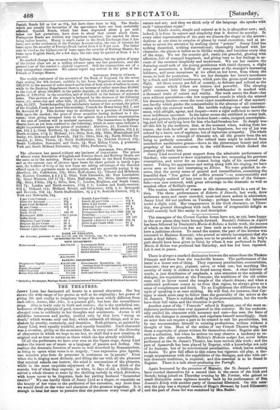There is always a marked distinction between the actors from
the Thektre Francais and those from the vaudeville houses. The performance of the latter is a looser sort of thing. They represent peculiarities, eccentricities, humours; they are gay, piquant, naive, or what not; but anything like severity of study is seldom to be found among them. A clear delivery of words, a just distribution of emphasis, a nice attention to the minuthe of dialogue, are requisitions at the Francais; the traditions of the old critics seem still to hover round the temple of the classic drama; and when a celebrated performer comes to us from that region, he always gives us a sense of completeness and finish. To an Englishman the difference in the style of speaking is at once striking. He will find, for instance, that Car- tigny is much more easy to follow than the generality of the actors at the St. James's. There is nothing shuffling in the pronunciation, but the words have their full value and the elocution is perfect.
Another actor of the "Francais" school is Regnier, one of the most sa- tisfactory performers that ever appeared in this country. He has undoubt- edly studied his character with accuracy and care—has seen the force of which the dialogue is susceptible, and regulates himself accordingly. Such an actor does not require a part to be created to suit his peculiarities, but, he can accommodate himself to existing productions, written without a thought of him. Most of the artists of our French Theatre bring with them a repertoire of pieces written for themselves alone: Regular also has such a collection, but when he arrives we may observe a tendency to re- produce the older comedies. Moliere's Medecin Lui, never before performed at the St. James's Theatre, has been revived this week; and the part of Sganarelle has been played by Regnier, with a knowledge not only of its humour, but of its conventional peculiarities, which leaves nothing to desire. To give full effect to this coarse but vigorous old play, a tho- rough acquaintance with the capabilities of the dialogue, and also with cer- tain dramatic traditions, is required; and this essential is to be found in Regnier. There is a talk about producing the Tartufe.


























 Previous page
Previous page